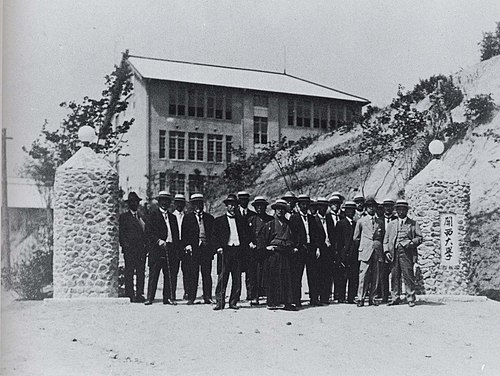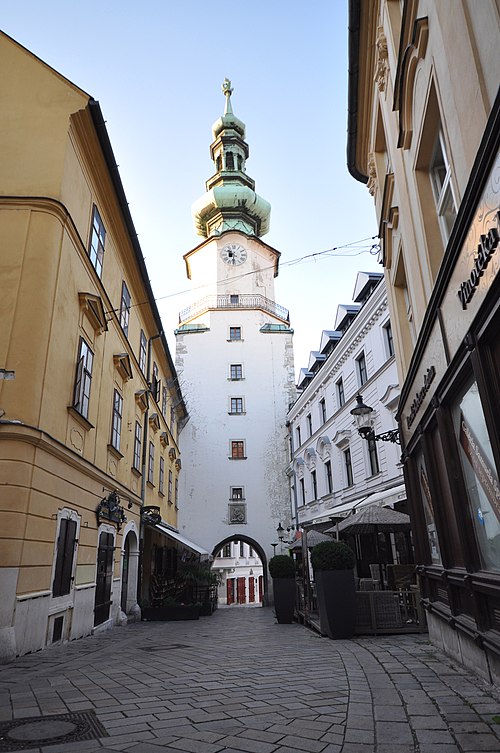Gatenoun
A doorlike structure outside a house.
Gatenoun
Doorway, opening, or passage in a fence or wall.
Gatenoun
Movable barrier.
Gatenoun
(computing) A logical pathway made up of switches which turn on or off. Examples are and, or, nand, etc.
Gatenoun
(cricket) The gap between a batsman's bat and pad.
Gatenoun
The amount of money made by selling tickets to a concert or a sports event.
Gatenoun
(flow cytometry) A line that separates particle type-clusters on two-dimensional dot plots.
Gatenoun
Passageway (as in an air terminal) where passengers can embark or disembark.
Gatenoun
(electronics) The controlling terminal of a field effect transistor (FET).
Gatenoun
In a lock tumbler, the opening for the stump of the bolt to pass through or into.
Gatenoun
(metalworking) The channel or opening through which metal is poured into the mould; the ingate.
Gatenoun
The waste piece of metal cast in the opening; a sprue or sullage piece. Also written geat and git.
Gatenoun
(cinematography) A mechanism, in a film camera and projector, that holds each frame momentarily stationary behind the aperture.
Gatenoun
A tally mark consisting of four vertical bars crossed by a diagonal, representing a count of five.
Gatenoun
A way, path.
Gatenoun
(obsolete) A journey.
Gatenoun
A street; now used especially as a combining form to make the name of a street e.g. "Briggate" (a common street name in the north of England meaning "Bridge Street") or Kirkgate meaning "Church Street".
Gatenoun
Manner; gait.
Gateverb
To keep something inside by means of a closed gate.
Gateverb
To punish, especially a child or teenager, by not allowing them to go out.
Gateverb
(biochemistry) To open a closed ion channel.
Gateverb
(transitive) To furnish with a gate.
Gateverb
(transitive) To turn (an image intensifier) on and off selectively as needed, or to avoid damage. See autogating.
Gatenoun
A large door or passageway in the wall of a city, of an inclosed field or place, or of a grand edifice, etc.; also, the movable structure of timber, metal, etc., by which the passage can be closed.
Gatenoun
An opening for passage in any inclosing wall, fence, or barrier; or the suspended framework which closes or opens a passage. Also, figuratively, a means or way of entrance or of exit.
Gatenoun
A door, valve, or other device, for stopping the passage of water through a dam, lock, pipe, etc.
Gatenoun
The places which command the entrances or access; hence, place of vantage; power; might.
Gatenoun
In a lock tumbler, the opening for the stump of the bolt to pass through or into.
Gatenoun
The channel or opening through which metal is poured into the mold; the ingate.
Gatenoun
A way; a path; a road; a street (as in Highgate).
Gatenoun
Manner; gait.
Gateverb
To supply with a gate.
Gateverb
To punish by requiring to be within the gates at an earlier hour than usual.
Gatenoun
a door-like movable barrier in a fence or wall
Gatenoun
a computer circuit with several inputs but only one output that can be activated by particular combinations of inputs
Gatenoun
total admission receipts at a sports event
Gatenoun
passageway (as in an air terminal) where passengers can embark or disembark
Gateverb
supply with a gate;
Gateverb
control with a valve or other device that functions like a gate
Gateverb
restrict (school boys') movement to the dormitory or campus as a means of punishment
Gate
A gate or gateway is a point of entry to or from a space enclosed by walls. The word derived from old Norse meaning road or path; But other terms includ yett and port.
Fatenoun
The presumed cause, force, principle, or divine will that predetermines events.
Fatenoun
The effect, consequence, outcome, or inevitable events predetermined by this cause.
Fatenoun
Destiny; often with a connotation of death, ruin, misfortune, etc.
Fatenoun
(mythology) lang=en (one of the goddesses said to control the destiny of human beings).
Fateverb
(transitive) To foreordain or predetermine, to make inevitable.
Fatenoun
A fixed decree by which the order of things is prescribed; the immutable law of the universe; inevitable necessity; the force by which all existence is determined and conditioned.
Fatenoun
Appointed lot; allotted life; arranged or predetermined event; destiny; especially, the final lot; doom; ruin; death.
Fatenoun
The element of chance in the affairs of life; the unforeseen and unestimated conitions considered as a force shaping events; fortune; esp., opposing circumstances against which it is useless to struggle; as, fate was, or the fates were, against him.
Fatenoun
The three goddesses, Clotho, Lachesis, and Atropos, sometimes called the Destinies, or Parcæwho were supposed to determine the course of human life. They are represented, one as holding the distaff, a second as spinning, and the third as cutting off the thread.
Fatenoun
an event (or a course of events) that will inevitably happen in the future
Fatenoun
the ultimate agency that predetermines the course of events (often personified as a woman);
Fatenoun
your overall circumstances or condition in life (including everything that happens to you);
Fateverb
decree or designate beforehand;































